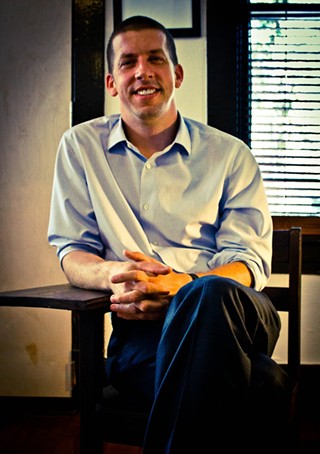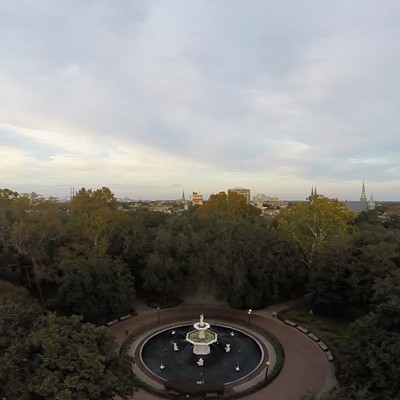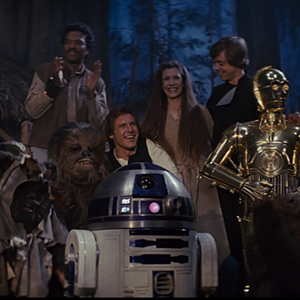School's back in session in Chatham County next week, and most kids already know the drill: Keep your pencils sharp and your nose clean and you'll be fine.
For the students at the Savannah Classical Academy (SCA), everything will be unfamiliar: New curriculum, new teachers, and a new principal, Benjamin Couch Payne.
The incipient charter school has brought on the 35 year-old Kentuckian to implement its classical curriculum, one based in the Socratic Method and other traditions of Western Civilization.
Strict grammar, logic and Latin may seem like dusty artifacts in this age of specialized magnet programs and an iPad for every student, but the theory that such subjects provide an invaluable foundation for continued learning has spurred a growing classical education movement. SCA follows the legacy of high-performing Urban Prep in Chicago and Uncommon Schools in New York City.
As the former principal of the classically-based West End School in Louisville, Payne knows this kind of success the program can bring to an urban school.
Of all the applicants for the job, "he was the standout," says SCA vice chairman Roger Moss.
Payne spoke with Connect in between teacher trainings and arranging desks at the former Scott Learning Center in Garden City, where SCA will spend its inaugural year before moving in 2014 into the former St. Pius X Family Resource Center at Anderson and Atlantic streets.
Until then, Payne will lead the SCA charge with the basics of reading, writing and the value of a firm handshake.
What are the key components of a classical education?
Benjamin Couch Payne: There are many different interpretations, and our particular model is focused almost exclusively in the beginning on language.
The foundation of education is in understanding the English language — grammar, spelling, phonetics. So we bring in Latin in the early grades for etymology and the identification of root words. The idea is that if we can have our students master the English language, they can access all of the knowledge and history and anything they want to from that point forward. They can even teach themselves.
Another strong component of our education is that we want our students to become good citizens. The very first thing I want all the children to learn is to shake your hand, look you in the eye and introduce themselves. It's amazing how difficult that is for many people, not just children.
Does classical education accommodate for special needs and other learning challenges?
BCP: This is a holistic approach to education and there's room for all kinds of learning differences.
At any given point, maybe you're in social studies, but that might correlate to an advancement in science or there's a moment to apply mathematical skills or a cite a work of literature or art or music all at the same time.
So you have the visual, the aural learning, you have the memorization, you have all the senses going. One child is focused in on an image and another is enthralled with the description coming from the teacher, others might be reading the text.
We have a traditional classroom format, with rows of desks facing the teacher and the teacher is leading the class. We're in the midst of a training with all of the faculty: The music teacher is also understanding what's going on in science, and the social studies teacher is in on the math curriculum, and everyone is looking at it through phonics.
At the same time, we'll administer all the standardized tests, and our charter dictates that we have to exceed certain standard on the CRCT.
I don't have any worries about faculty – every single one of them is exceptional. They're ready to go.
Will other students who graduate from the district's other K-8 schools be eligible for the high school program or do students need to have the SCA classical foundation?
BCP: It's a K-12 school, and I don't plan on having too much attrition. But there will be a handful of slots every year. I still think you can take a student at their junior year, certainly their sophomore year, and still make enough of an impact to make it worth their time.
The founding fathers of this country emphasized that in order to have a successful democracy we have to have an educated citizenry.
And the key point is that they were talking about education being available to everybody.
So you started out in education?
BCP: Actually, I started out as an architect.
Whoa. Really?
BCP: [laughs] Yes, it's served me really well. I draw from architecture every single day. We're in a building right now that needs a little bit of work, so I'm able to work with the contractors. I won't be helping with the design, but at least I'm familiar with the process.
How did you make that leap?
BCP: I was working in a small little office by myself in Louisville and right next door was a private school called Highlands Classical School. They had a job open up for a part-time calculus teacher, for two days a week.
I thought it would be fun — within a couple a weeks I was teaching three classes and became very involved.
I'm so glad I switched. I'm much, much happier.
What are your goals in this first year?
BCP: It's all about the school culture. Some are going to come in and they'll just get it right way, clicking right off the bat. That's one challenge, to make sure they're being pushed to their very best.
Then other children are going to need more time, and we have to figure how they learn best. But it's not a month-long process — it's not even a year-long process.
The beauty of this school is that there are going to be kindergarten through 12th graders, and we get to help develop these children for potentially 13 years. We're going to have over 300 students in the building, K-6, and that sixth grade class will be the first graduating class in 2020. That's just fantastic.


























